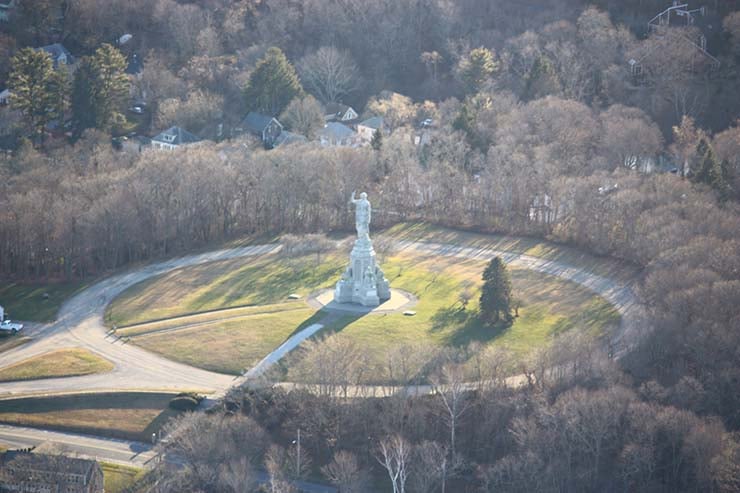On a hill overlooking Plymouth, Massachusetts, is the 81-foot National Monument to the Forefathers. Designed by Boston architect and illustrator Hammat Billings, it’s the tallest solid-granite monument in the United States. Though not nearly as well-known as some other American monuments—Mount Rushmore, the Lincoln Memorial, the Statue of Liberty—the National Monument to the Forefathers has a special message for American patriots, particularly in our age of acrimony and hatred.
A 35-foot statue of Faith stands atop this massive sculpture, her right hand raised toward heaven, her left holding a Bible. On the buttresses below are four other figures, representations of Morality, Education, Law, and Liberty. Each is accompanied by two side panels, smaller depictions in stone further explaining the attributes of the primary buttress. Education, for instance, who holds an open book in her lap, is accompanied by Youth and Wisdom. Youth offers a lovely image of a mother holding her child’s hand and gazing down with at him with stern devotion and love, while Wisdom is an old man gesturing toward a Bible.
Four additional panels tell the history of the Pilgrims in bas-relief, while two others list the names of those first settlers. Another panel on the back base of this monument quotes a passage from Pilgrim Father William Bradford’s “Of Plymouth Plantation”: “Thus out of small beginnings greater things have been produced by His hand that made all things of nothing and gives being to all things that are; and as one small candle may light a thousand, so the light here kindled hath shone unto many, yea in some sort to our whole nation; let the glorious name of Jehovah have all praise.”
During the 1889 dedication ceremonies, Rep. William Breckinridge of Kentucky said of the monument, “For ages it will stand the enduring witness to grave and resolute conduct; to privations and sacrifices; to thrift and frugality; to domestic love and unaffected piety; to rectitude in thought as well as in life; to earnest principles and true beliefs; to Christian fidelity and faith….”
Noble words, and yet in our present state of cultural chaos this gathering together of words and statuary seems more a gravestone of American values than a celebration, a lamentation in granite for vanishing American principles.
Faith, Morality, Education, Law, and Liberty have undergone a decades-long siege in our country, an assault which has only intensified in the 21st century. Indeed, we have drifted so far from the faith and morality enshrined in the National Monument to the Forefathers that to create such a work of art today would assure savage criticism and violent protests.
The right blames the left for this destruction of American values, and certainly that case can be made. Since the 1960s in particular, our ever-more radicalized culture and courts have driven religious faith from the public square, made morality a matter of “You do your thing, I’ll do mine,” eroded the public school system, undermined the law, and have tried, and in some cases, succeeded, in restricting such basic liberties as freedom of speech. Through propaganda and intimidation, the left now dominates institutions like corporate media, teachers’ unions, federal agencies, and even the U.S. military.
Yet many conservatives, or those who lay claim to that name, either encouraged or closed their eyes to this assassination of tradition and virtue: the politicians who declared themselves fiscal conservatives, but let social issues slide; the commentators and gurus who pushed democracy in war zones like Afghanistan while refusing to engage in the culture war in America; all those whose tolerance soon gave way, however reluctantly, to acceptance of what were once regarded as aberrations. Even most of those willing to defend the old ways used secular arguments in their resistance, too embarrassed or too frightened to inject Biblical principles into public debate.
There are exceptions. A case in point: In his recently published book Born to Be Brave: How to Be a Part of America’s Spiritual Comeback, actor, film producer, and writer Kirk Cameron argues for re-embracing America’s Christian roots. After reminding readers of that spiritual heritage while using as an example the National Monument to the Forefathers, Cameron urges us to show courage and step with confidence onto the battlefield of culture.
Many others have also recently raised that banner. Online writers and podcasters are giving audiences the real meat of truth rather than the mush so often cooked up by the mainstream media. Women like Joy Pullmann, Katy Faust, and Carrie Gress are just some of today’s strong defenders of marriage and the family. The COVID school closures raised up tens of thousands of American parents who either began homeschooling their children or found innovative ways of educating them, such as pod schools.
There’s room in this growing movement for those conservatives whose religious faith is lukewarm or non-existent. Like some of the founders, they can find in Scripture the moral foundations of Western civilization and can do so without joining a church or professing a creed. The Ten Commandments, the Bible’s wisdom books, and many of the teachings of Christ and his Apostles apply to all human beings.
If we have the courage and the will, each of us has the power to institute in our lives, our homes, and our communities the principles embedded in the granite of the National Monument to the Forefathers. Where that may lead is anyone’s guess, though my money is on the words of William Bradford: “One small candle may light a thousand.”
Strike a match, light that candle, and we’ll build a monument of flesh and spirit all our own.

Leave a Reply